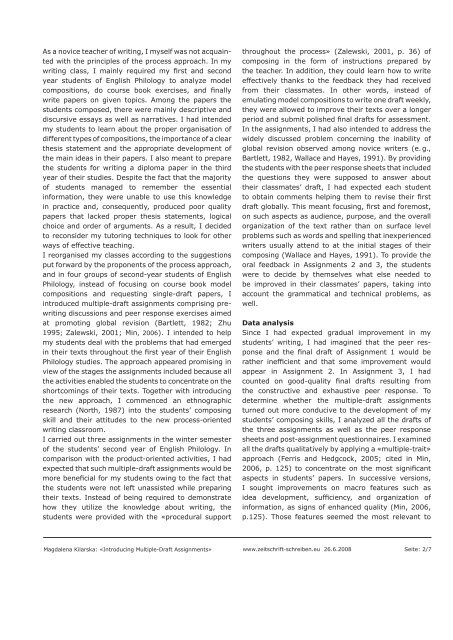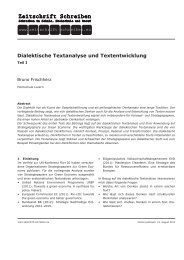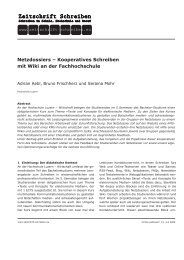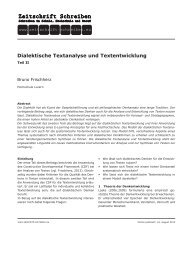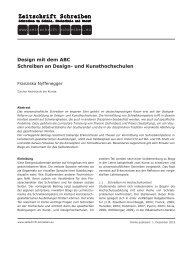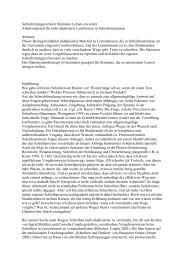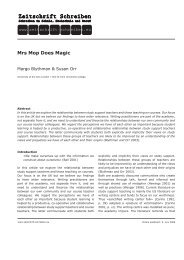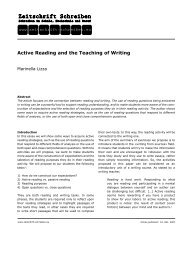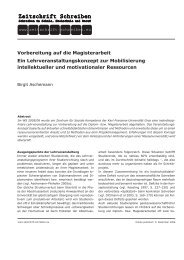Download - Zeitschrift Schreiben
Download - Zeitschrift Schreiben
Download - Zeitschrift Schreiben
Create successful ePaper yourself
Turn your PDF publications into a flip-book with our unique Google optimized e-Paper software.
As a novice teacher of writing, I myself was not acquainted<br />
with the principles of the process approach. In my<br />
writing class, I mainly required my first and second<br />
year students of English Philology to analyze model<br />
compositions, do course book exercises, and finally<br />
write papers on given topics. Among the papers the<br />
students composed, there were mainly descriptive and<br />
discursive essays as well as narratives. I had intended<br />
my students to learn about the proper organisation of<br />
different types of compositions, the importance of a clear<br />
thesis statement and the appropriate development of<br />
the main ideas in their papers. I also meant to prepare<br />
the students for writing a diploma paper in the third<br />
year of their studies. Despite the fact that the majority<br />
of students managed to remember the essential<br />
information, they were unable to use this knowledge<br />
in practice and, consequently, produced poor quality<br />
papers that lacked proper thesis statements, logical<br />
choice and order of arguments. As a result, I decided<br />
to reconsider my tutoring techniques to look for other<br />
ways of effective teaching.<br />
I reorganised my classes according to the suggestions<br />
put forward by the proponents of the process approach,<br />
and in four groups of second-year students of English<br />
Philology, instead of focusing on course book model<br />
compositions and requesting single-draft papers, I<br />
introduced multiple-draft assignments comprising prewriting<br />
discussions and peer response exercises aimed<br />
at promoting global revision (Bartlett, 1982; Zhu<br />
1995; Zalewski, 2001; Min, 2006). I intended to help<br />
my students deal with the problems that had emerged<br />
in their texts throughout the first year of their English<br />
Philology studies. The approach appeared promising in<br />
view of the stages the assignments included because all<br />
the activities enabled the students to concentrate on the<br />
shortcomings of their texts. Together with introducing<br />
the new approach, I commenced an ethnographic<br />
research (North, 1987) into the students’ composing<br />
skill and their attitudes to the new process-oriented<br />
writing classroom.<br />
I carried out three assignments in the winter semester<br />
of the students’ second year of English Philology. In<br />
comparison with the product-oriented activities, I had<br />
expected that such multiple-draft assignments would be<br />
more beneficial for my students owing to the fact that<br />
the students were not left unassisted while preparing<br />
their texts. Instead of being required to demonstrate<br />
how they utilize the knowledge about writing, the<br />
students were provided with the «procedural support<br />
throughout the process» (Zalewski, 2001, p. 36) of<br />
composing in the form of instructions prepared by<br />
the teacher. In addition, they could learn how to write<br />
effectively thanks to the feedback they had received<br />
from their classmates. In other words, instead of<br />
emulating model compositions to write one draft weekly,<br />
they were allowed to improve their texts over a longer<br />
period and submit polished final drafts for assessment.<br />
In the assignments, I had also intended to address the<br />
widely discussed problem concerning the inability of<br />
global revision observed among novice writers (e. g.,<br />
Bartlett, 1982, Wallace and Hayes, 1991). By providing<br />
the students with the peer response sheets that included<br />
the questions they were supposed to answer about<br />
their classmates’ draft, I had expected each student<br />
to obtain comments helping them to revise their first<br />
draft globally. This meant focusing, first and foremost,<br />
on such aspects as audience, purpose, and the overall<br />
organization of the text rather than on surface level<br />
problems such as words and spelling that inexperienced<br />
writers usually attend to at the initial stages of their<br />
composing (Wallace and Hayes, 1991). To provide the<br />
oral feedback in Assignments 2 and 3, the students<br />
were to decide by themselves what else needed to<br />
be improved in their classmates’ papers, taking into<br />
account the grammatical and technical problems, as<br />
well.<br />
Data analysis<br />
Since I had expected gradual improvement in my<br />
students’ writing, I had imagined that the peer response<br />
and the final draft of Assignment 1 would be<br />
rather inefficient and that some improvement would<br />
appear in Assignment 2. In Assignment 3, I had<br />
counted on good-quality final drafts resulting from<br />
the constructive and exhaustive peer response. To<br />
determine whether the multiple-draft assignments<br />
turned out more conducive to the development of my<br />
students’ composing skills, I analyzed all the drafts of<br />
the three assignments as well as the peer response<br />
sheets and post-assignment questionnaires. I examined<br />
all the drafts qualitatively by applying a «multiple-trait»<br />
approach (Ferris and Hedgcock, 2005; cited in Min,<br />
2006, p. 125) to concentrate on the most significant<br />
aspects in students’ papers. In successive versions,<br />
I sought improvements on macro features such as<br />
idea development, sufficiency, and organization of<br />
information, as signs of enhanced quality (Min, 2006,<br />
p.125). Those features seemed the most relevant to<br />
Magdalena Kilarska: «Introducing Multiple-Draft Assignments» www.zeitschrift-schreiben.eu 26.6.2008 Seite: 2/7


